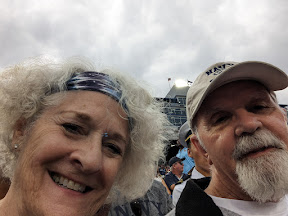Apologies to Robert Heinlein for lifting the title of one of his books for this blog entry, but it fits. I’ve been thinking a lot about identity lately. Racial identity, gender identity, national identity, political identity. It all used to be so simple. I was white, female, American and Democrat. Simple categories. Until I found myself no longer in the majority. Until I found myself a real stranger in a strange land.
What brought this to the surface was an excellent post by my dear friend. LeRon Barton, whose recent Salon.com article laid out clearly what it’s like to be a black man in America today. I can’t pretend to know what it feels like to be black in America, but I do know what it feels like never to be able to fit in.
When I was barely 21, I moved to Japan for a two-year Masters course at Keio University, one of Japan’s leading universities. I’d studied the language for four years and felt reasonably sure that I’d be able to communicate on a rudimentary basis, at least.
My plane landed at Haneda Airport near downtown Tokyo. When I walked down the stairway and looked around, my absolute first conscious thought was, “Holy cow. Everybody’s Japanese.” Well, duh. Of course everyone was Japanese. It was Japan, for crying out loud. I’m just flown in on an American carrier (Pan-Am) with lots of Japanese, Chinese, Americans and who knew what else. I’d just come out of UCLA where my classes were so multi-cultural, so multi-racial, that I took such diversity as the norm.
Not so in Japan. The norm is to be Japanese. The exception is to be everything else. I was an everything else. It took time to get used to being followed on the streets, not with the concern that LeRon talks about, but by people with an overwhelming curiosity about all things American. I gave up my personal privacy when out in public because I looked different. My accent was heavily overlaid with Californian Japanese when I first arrived. Two years later when my accent was much closer to Tokyo Japanese, people still recoiled when I spoke. I might have spoken fluent Japanese, but their ears heard “foreign speaker.”
No, I don’t know what it’s like to have people follow me in a store because they’re afraid I might steal something. I do know what it’s like to be followed to see what I bought. I have been guilty of the “purse clutch” in many different cities in the U.S. and in about a dozen countries. I grew to be wary because of my color, my nationality and the way I dressed.
We can all take a close look at how we react when we seen people who don’t look like us on a sidewalk. Not every young black man with his pants dragging on the ground is a thief, murderer or rapist. Not every young Middle Eastern man is a terrorist. Not every Southern white is a redneck and racist.
So, LeRon, I haven’t walked in your shoes, but I’ve been close. Thank you so much for such a thoughtful and educational essay. You are my hero.


Betsy, You remind me forcefully of two experiences. When I was a freshman at Emory University in Atlanta, in 1963, an Episcopal priest friend took me to a dinner at Morehouse University. I had come to Emory from a small town sixty miles northwest and only saw black people in the traditional and predictable roles in which they were still trapped in the deep South. I suddenly found myself in a room full of lawyers and doctors and businessmen and professors–not one of them white. It was the beginning of a new life for me, an instant understanding. I was overwhelmed. I recently wrote a blog about Julian Bond. That, too, was part of that first year in the world. Much later, in 1986, I read an article by Brent Staples in Harper’s called “Black Men and Public Space,” and had another epiphany–of the kind you describe. Thank God for these moments when we are changed! My article, written for a fellow author’s blog, is at http://www.sswriter.com/a-dream-from-julian-bond-guest-post-from-dean-robertson/. Writing it was another one of these awakenings you describe here so eloquently, Betsy Ashton, I find so often now that you write what I need to read. Bless you for blogging out loud!!!
What I like, Dean Robertson, is that we have never forgotten the moments of epiphany. May we never stereotype people. Period.